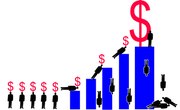It is difficult to precisely define economics since it's a broad discipline. An easy way to understand economics is to define it as a branch of social sciences that studies the production, consumption and distribution of wealth along with human welfare. Microeconomics and managerial economics are the sub-divisions of economics along with others such as macroeconomics, behavioral economics, development economics, environmental economics or financial economics. There are some fundamental differences between these two subdivisions.
Definitions
Microeconomics is the study of a single or an individual unit of an economy. It focuses on determining the market prices through demand and supply where the deciding units are consumers and firms. Therefore, it pays attention to individuals' income and output. Resource allocation is also an important element of microeconomics, which entails availing resources in an efficient way so it fulfills the requirements of an economy. On the other hand, managerial economics applies the economic theories and analytical tools to provide choices for a firm. It deals with different methodologies and principles for businesses to allocate scarce resources for decision-making.
Outcomes
The two branches can be differentiated on the basis of results produced by each. As mentioned, microeconomics involves both firms and consumers, therefore it has a broader scope. The effects of microeconomics are on an individual's behavior, which can be either producer or consumer, but managerial economics narrows it down to businesses only. The outcomes produced by managerial economics influence the decision-making of firms.
Positive and Normative Economics
Positive economics explains facts in the exact manner in which they are, and what they will be. It is objective in nature, while normative economics provides value judgment and expresses an opinion on what it ought to be. Microeconomics consists of both since they are both a part of its scope. Managerial economics, however, is normative because it provides judgment on the outcomes of a firm. It analyzes the future position of a firm so it does not contain any factual content. The effects of a firm's decisions are discussed, explaining what a firm should do to achieve its objectives.
Macroeconomics
Macroeconomics deals with economy as a whole, combining all the units. Microeconomics is the study of an individual's behavior that does not have a grain of macroeconomics. On the other hand, managerial economics applies microeconomics in a significant way and considers macroeconomic theories as well while analyzing results. Therefore, it is a combination of both microeconomics and macroeconomics; for instance, it applies demand, supply or cost through microeconomics and also takes into account national income or inflation under macroeconomics.
Related Articles
References
Writer Bio
Dr. Muhammad Haq has been writing for over 10 years on medicine and health issues in the "British Medical Journal" and on various websites. He graduated from the University of Edinburgh with a degree in medicine and obtained membership in the Royal College of Physicians in the U.K. Dr. Haq has been teaching in the Gloucestershire Royal Hospital since.











